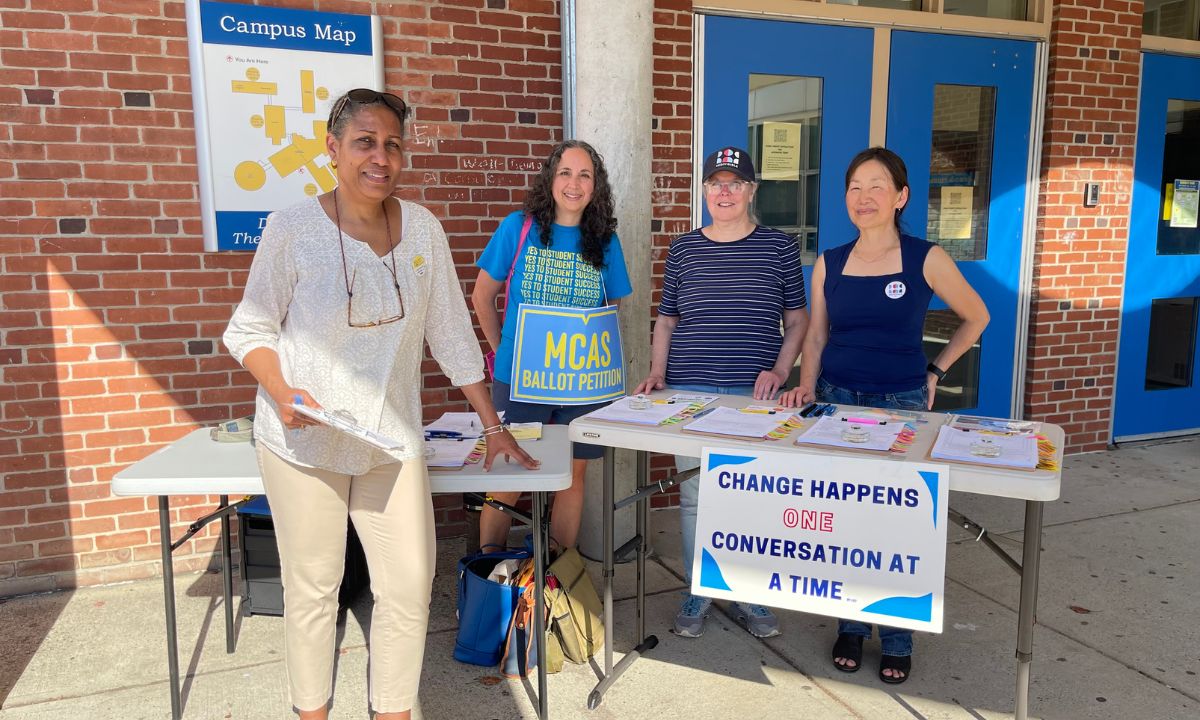This story first appeared at The 74, a nonprofit news site covering education. Sign up for free newsletters from The 74.
![]() Latest polling shows 58% of voters would get rid of the MCAS exam as a graduation must amid debate over learning standards vs. student well-being.
Latest polling shows 58% of voters would get rid of the MCAS exam as a graduation must amid debate over learning standards vs. student well-being.
![]()
Massachusetts mom Shelley Scruggs says she’s spent the last decade thinking and worrying about standardized testing — specifically the three exams her son would need to pass in order to earn a high school diploma.
A junior at a technical high school in Lexington, her son, who has ADD and an Individualized Education Program, has always found greater success with interactive, hands-on learning and is now studying plumbing.
Last spring, he took the English, science and math exams. While she believes it’s important to assess how kids are doing in school, a frustrated Scruggs sees the exam requirement as forcing teachers to teach to a test, narrowing curriculum, putting undue stress on students and making the most vulnerable feel bad about themselves.
Her son is one of the approximately 70,000 10th graders who sit for at least one of the three Massachusetts Comprehensive Assessment System (MCAS) exams each year. Based on state policies, students must earn a passing score on all three exams to earn a diploma. Those who don’t can try again at least four times and some students are able to participate in an appeal process or an alternative pathway. Ultimately, the vast majority of students — about 99% — meet the requirements.
10 LAUSD schools get a chance to opt out of standardized testing]
Scruggs said her son’s experiences motivated her to try and repeal the state’s graduation requirement. She drafted a ballot initiative last year and began collecting signatures, ultimately joining efforts with the Massachusetts Teachers Association. After collecting 170,000 signatures, the union got the question officially certified on the Nov 6 ballot, where it will appear as Question 2.
Lexington parent Shelley Scruggs, who initiated the ballot question to end the MCAS grad requirement, told legislators: This test “penalizes students like my son who are just not good test-takers.” #ThriveAct #mapoli pic.twitter.com/TtvtuqxA6g
— Massachusetts Teachers Association (@massteacher) October 4, 2023
The measure does not propose eliminating the administration of the MCAS exam, but rather its role as a statewide graduation requirement. If it passes, Massachusetts would have no statewide graduation requirements, making it an outlier nationally. Instead, its some 300 districts would determine requirements locally.
Scruggs recently got a call from her son’s guidance counselor: He passed his math and science MCAS exams but failed the English exam by one point. Describing it “as the best phone call I ever got in my life,” she remains staunchly opposed to the graduation requirement and is campaigning alongside the union in favor of Question 2.
The statewide teachers association has spent more than a million dollars on the effort. MTA President Max Page told The Boston Globe, “We’ve long believed that this fixation on this one test does not help us understand how a student or school is doing.”
Page, and other union representatives, did not respond to The 74’s multiple requests for comment.
“I think Massachusetts in many ways is a bellwether for what goes on around the country.”
Evan Horowitz, executive director,
Center for State Policy Analysis
Those who want to keep the requirement and see the ballot measure defeated — including Gov. Maura Healey, Secretary of Education Patrick Tutwiler and The National Parents Union — argue that the MCAS is a high-quality assessment that is necessary to hold schools accountable, communicate progress with students and their parents and establish consistent academic expectations statewide.
According to the latest polling, conducted between Oct. 2-6 by Suffolk University and the Globe, 58% of the 500 Massachusetts residents surveyed plan to vote “yes,” on Question 2, eliminating the MCAS graduation requirement, and 37% plan to vote “no.”
The state education department recently released the 2024 test results, which predictably dropped in the pandemic’s wake and following the state Board of Elementary and Secondary Education’s decision — implemented for the first time this spring — to raise the bar for what’s considered a passing score.
Statewide, 57% of 10th graders exceeded or met expectations on the English exam, 48% on the math exam, and 49% on the science one. Historically, only 1% of students — around 700 total — ultimately miss the requirement, the majority of whom are English language learners or have a disability.

Courtesy Keri Rodrigues
Keri Rodrigues
Massachusetts resident Keri Rodrigues, president of the National Parents Union and the parent of five kids, one of whom receives special education services, believes that getting rid of the requirement in the name of kids with disabilities is “really offensive.”
“[My son] absolutely took and passed the MCAS … Kids like Matthew are capable not only of proficiency,” she said, “but excellence.”
Rodrigues argued that the data collected from MCAS scores actually contribute to equity, rather than detracting from it.
“The idea that we would just toss away data and call it social justice,” she said, “is just — it’s wild to me… we need more data and information on our kids so that we can be better equipped to help them and figure out what the challenges are.”
Massachusetts as a bellwether
The MCAS graduation requirement goes back to the 1993 Education Reform Act; it’s been used since 2003 as part of the graduation standard. Before that, the only state requirements were a U.S. history course credit and gym classes.
And what happens in Massachusetts, ranked the top state for public education nationally, matters greatly, said James Peyser, former state education secretary.
As election day nears and the debate intensifies, neither side wants to focus on the high passing rate, according to Evan Horowitz, the executive director of The Center for State Policy Analysis at Tufts University who authored a report on the ballot measure. He found that those who don’t pass the MCAS typically don’t meet district requirements for graduation either.
Critics warn Massachusetts, long a leader in education, is losing its edge]
]Related: ‘Not waiting for people to save us’ — 9 school districts combine forces to help students]

Courtesy Evan Horowitz
Evan Horowitz
Evan Horowitz is the executive director of The Center for State Policy Analysis at Tufts University and authored a report on the ballot measure. (The Center for State Policy Analysis).
Those in favor of the exam insist it’s a rigorous standard and those opposed insist it’s an unfair hurdle, “so there’s sort of no constituency to the argument that actually this test might be too easy to really matter, certainly too easy to have a big, statewide fight over,” he said.
John Papay, director of the Annenberg Institute at Brown University and lead author of a study on the MCAS exam, said both test scores and course grades predict longer-term student outcomes and test scores can tell us something beyond grades about how well high schoolers are prepared for college and career.
He remains concerned about how well vulnerable student groups are being served overall.
“The question about the exit exam is a little bit of a red herring around this bigger, critically important question about, ‘How are we ensuring that English learners [and] students with disabilities, are getting the skills that they need out of the Massachusetts public education system?’”
***
Amanda is a Staff Reporter at The 74. She joined the site after reporting internships at The Maine Monitor and The Miami Herald, where she covered book bans, homeschooling regulations, the substitute teacher shortage, stagnant teacher salaries and private for-profit universities. Amanda was a Stabile Investigative Fellow at Columbia’s School of Journalism.
The 74 is a nonprofit news organization covering America’s education system. The 74 centers their reporting on the teachers, innovators, researchers, school leaders and politicians who shape that education. Their mission is to lead an honest, fact-based conversation about how to give American students the skills, support and social mobility they deserve. Backed by data, investigation, and expertise. Sign up for free newsletters from The 74.






























